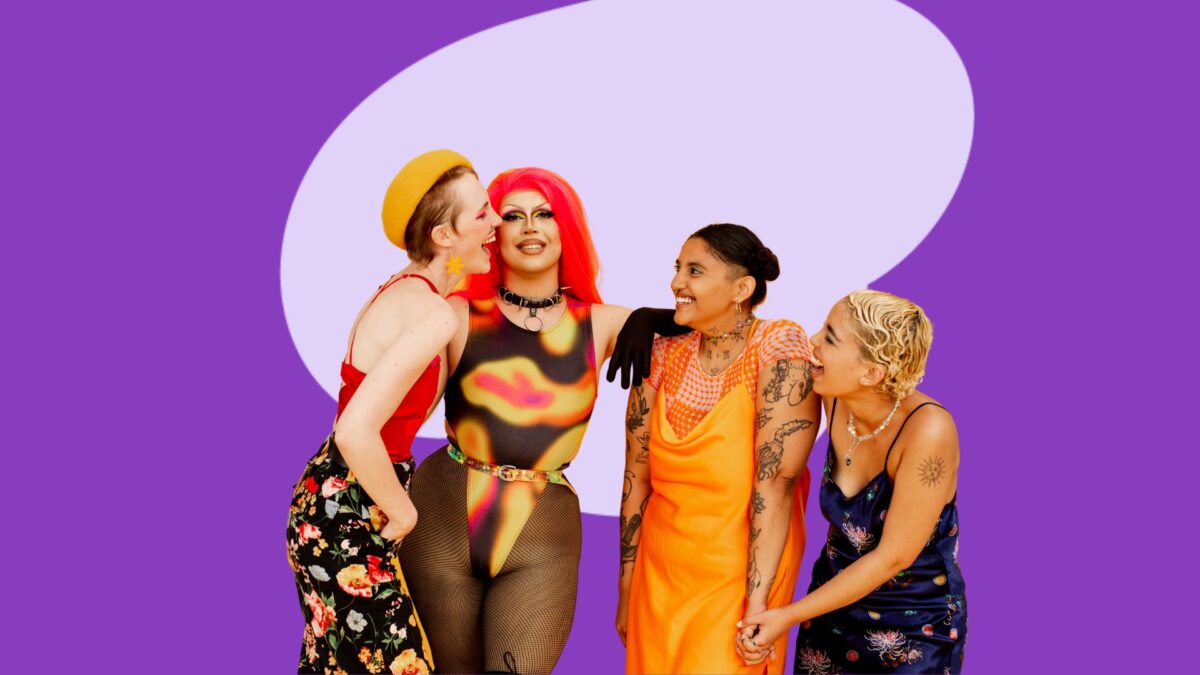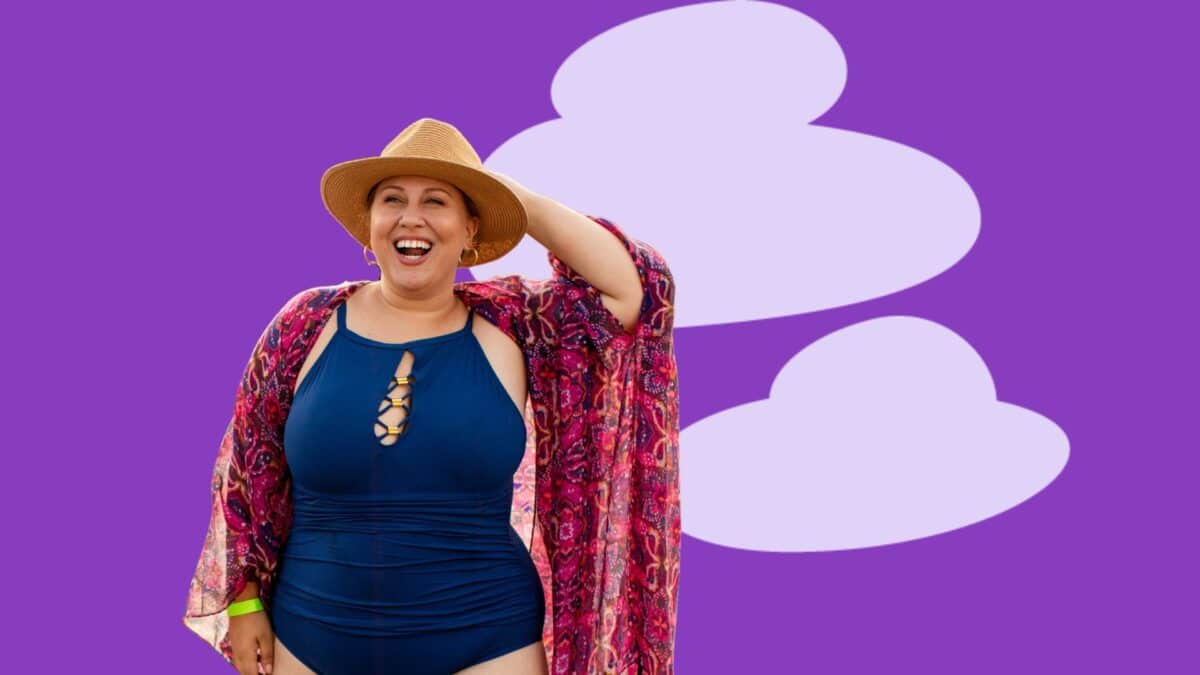Coming out as bi, accepting your bisexuality, or questioning your validity as a bisexual person is a difficult and tricky road to begin travelling. There are no handbooks, no guidelines, or any hard and fast rules that you can follow.
But there is some good news. What’s that? We have basically written the bisexuality master doc! Ok, maybe not the master doc, but we are talking about everything and anything related to bisexuality – especially the things that other people like to avoid or forget.
So, cuff your jeans and buckle up! It’s gonna be a wild ride!
Accepting Your Sexuality
If you’re anything like us, and many many other bisexuals, you didn’t realize you were bisexual until you were a full-fledged adult. Our sexuality never changed – we were always bisexual. It just took a little bit longer for us to figure out. The lightbulb was always there…it was only just recently turned on!
Soooo many bisexual people think that they’re straight, and soooo many bisexual people think that all straight people fantasize about having sex with people of the same gender. News flash! They don’t! You might’ve played off your same-sex crushes as just “fun,” or your attraction to certain celebrities as something influenced by pop culture. And even though you felt these attractions, you still identified as straight.
But you’re here, you’re queer, and you don’t know where to start on your journey to understanding and accepting your bi-identity. Maybe you’re just coming out as bi, or maybe you’ve been out for years! Whatever the case is, we’re dissecting it all! We’re breaking it down and talking about stuff that other people aren’t. So, let’s prepare to get a little vulnerable. Don’t worry, we’re in this together!
Compulsory Heterosexuality
You might’ve heard the term “comphet” on socials lately. It’s the cute, shortened term for Compulsory Heterosexuality. What is Compulsory Heterosexuality? Adrienne Rich wrote about the concept in her essay “Compulsory Heterosexuality and Lesbian Existence,” published in 1980. In the essay, Rich argued that heterosexuality is not natural, but instead an institution imposed on women to keep them subordinate and subservient to men in society. Comphet basically assumes that heterosexuality is the default sexual orientation of all people. Rich wrote this essay as a way of challenging the erasure of lesbianism from scholarly and feminist literature, and it’s now making a major resurgence in LGBTQ+ discourse (THANK YOU!).
More and more Queer people are realizing that comphet is actually hella applicable to their sexuality and situation. Many of us didn’t grow up with queer representation in the media, and only straight relationships were encouraged and promoted around us. Dolls were for girls, and toy trucks were for boys. “That’s just the way it is,” still echoes in our brains. Nothing was telling us that it was ok to be queer and nothing gave us permission to act on what we felt inside of us.
A narrative has been constructed in pop culture about bisexuality where it has been looked at as a joke, a “stop on the way to gay-town,” or simply a fake term used for people who can’t make up their minds. All of this also plays into the idea of comphet. Bisexual people are told that their attractions aren’t real, so many of us default to identifying as straight, then end up eventually (hopefully) coming to terms with our sexuality a bit later in life.
Bi-Imposter Syndrome
A lot of bisexuals face an internal battle because of our attraction to different genders. It’s like we have Imposter Syndrome, but the bi kind. This is when we doubt ourselves, doubt our attractions, and feel influenced by the messages we hear about bisexuality that are out in the world. When we hear negative messaging about bisexuality, it can really impact how we view ourselves! Even if it’s just a joke or an innocent stereotype (like cuffing our jeans). We can still feel like if we don’t do certain things, or act a certain way, that we aren’t actually bi.
Having a lack of representation can also make us doubt ourselves and lose trust in what our gut is saying. The media we consume, and the narratives within that content, can impact how we come to accept our sexuality — particularly when the bisexual identity is a joke or “not real.” It’s like being gaslighted by the media. We’re told that we’re just at the pitstop before we “become gay,” or we’re just “acting bi” to be shocking. Ugh.
Coming Out
Bisexuals don’t always come out. Sometimes it feels like we’re living a life shrouded in mystery. Bisexuals (particularly bisexual men) don’t come out to their family or partners because they fear they’ll be ostracized by their loved ones. If this sounds familiar to you, you’re not alone!
A lot of bisexuals in straight-passing relationships are hesitant to come out. (Hiiii!) There can be a sense that you’re not “bi-enough” that can harbour hesitation about coming out because you’ve never had a partner, or experience, with someone of your gender. Maybe you’ve been with your partner of the opposite gender for years and don’t want to come out to avoid questions or criticism. That’s totally fair! You do what’s best for YOU!
If you do decide to come out, there are so many ways that you can choose to do it. It can feel like a weight off of your shoulders, but it can also feel like you’re intruding into a space that’s not totally welcoming to your sexuality.
Biphobia
Biphobia is the belief that bisexuality is lesser than, or not-as-real as, other sexualities. People can view bisexuality as unnatural, a choice, and something to be ashamed of or looked down upon. It’s often not taken as seriously as other sexuality-based phobias, but biphobia can be just as impactful as homophobia, transphobia, or any other form of discrimination against someone in the LGBTQ+ community.
Studies have shown that bisexual people don’t come out to the people in their lives as much as lesbian and gay people do. We can hold a lot of confusion about our identity and sexuality, and there can be a lot of negative messaging around bisexuality that leads to the development of mental health struggles like anxiety, depression, and more.
Internalized Biphobia
Ok, so we talked about feeling bi-imposter syndrome. But now we’re going to talk about something that many of us don’t want to confront — internalized bi-phobia. Yes, you can be biased and phobic against yourself…and it feels awful. Like we said, as bisexuals we tend to question our sexuality more than our queer counterparts.
This is particularly prevalent in men. Men don’t have a lot of bi-representation, so many are left battling their sexuality from a perspective of legitimacy and acceptance. Are they bi? Are they gay? It seems to be more culturally acceptable for women to be bisexual, so men are sometimes left wondering if it’s even possible for them to be bi. We’re here to tell you — it is absolutely possible! It’s also possible for a trans person who defies the gender binary to be bisexual. It’s all about connecting with a label that feels right for you!
Often as bisexual people are discovering their sexuality, there’s a growing confusion about the emotions and attractions they feel. This can lead to self-esteem issues, self-hatred and other mental health issues. And these issues aren’t helped when the messaging from your family and friends isn’t supportive and loving.
From Friends and Family
Many bisexual people choose to keep their sexuality under wraps and never reallyyyy come out. You might tell some trusted people in your life, but many bisexuals aren’t known for making an announcement or a coming-out post on the ‘gram. This is because we don’t feel like facing any criticism, scepticism, or backlash from our closest friends and family.
Family and friends often overlook the attraction to people of the same gender and see bisexuality as a curiosity or a choice. Some people experience their family and friends avoiding the topic of their sexuality, or asking about relationships only with people of the opposite gender.
We just wish that our parents would support us and that our friends would accept us with no questions asked. When that doesn’t happen, it stings, it hurts — and holy crap does it suuuuck! But we see you and we’ll always be here for you! No coming out post needed!
In the LGBTQ Community
Bisexual people search for a welcome space in the queer community but are sometimes met with hostility. Bisexual men are assumed to not be ready to claim the title of being gay, and bi women are looked at as “just experimenting.” But both men and women are shamed for being in straight-passing relationships. Even though we’re part of the acronym, many bi people still feel like they’re the invisible “B” in the LGBTQ+ community.
A study in 2016 found that biphobia persists in all communities. Research has found that bisexual people are marginalized by both heterosexual people and those in the LGBTQ+ community. Oof! Some Queer people see a bi-person in a straight-passing relationship as less queer, and less legitimate, than if they were in a relationship with someone of the same sex.
The Need for BiCons (Bi-Icons) in Pop Culture
There are many stereotypes about bisexual people that are perpetuated by society. We can be seen as sexually promiscuous, rebels against lesbian and gay communities, and attention-seeking dramatics. And bisexuals are often criticized (and then fetishized) by straight men who see bisexual women as an opportunity for a threesome — as though a woman’s bisexuality is actually a way to play into the male gaze.
Bisexual men are judged by society because they are seen as only just beginning their journey to homosexuality. The male bi-identity is so overlooked, forgotten and looked down upon because of the toxic masculinity that is so prevalent in all aspects of our culture. Unfortunately, so many prominent male bisexuals have been categorized as gay — like Freddie Mercury. So, bisexual men don’t have many role models in pop culture to look up to for encouragement and direction.
The internal struggle of bisexual people could be made so much easierrrrr if pop culture and media would portray bisexuality in positive and complex ways.
Bisexuality Affirmation
If you’re struggling to accept your bisexuality, you’re not alone. Like we said, so many bisexual people struggle to accept their sexuality because of confusion, cultural messaging, internalized biphobia, and biphobia from other communities.
Accepting Your Bisexuality
If you’re still questioning then think about this…straight people don’t spend all of their time wondering if they’re straight. They don’t worry about how their relationships are perceived. So if you’re worrying about if you’re bi enough, let us be the first to tell you that YOU ARE. You’re 100% bi-enough. 100% queer enough. And you’re worthy of accepting yourself regardless of your dating history, or what anyone else might tell you.
You are worthy of owning the bisexual label if that’s what feels right to you. Bisexuality doesn’t have to mean that you’re only attracted to two genders either. You can be bi and still attracted to everyone within, and beyond, the gender spectrum. And, bisexuality is not limited to just men or women…you can be agender, non-binary, gender non-conforming, gender fluid, or any other gender expression! If the label of bisexual feels right, then that’s what matters most of all.
It can be hard to start owning and accepting your bisexuality. Saying it out loud for the first time can be a bit scary! (And if saying it out loud 10 more times is still a little scary, that’s ok too.) So take it slow at first. Only do what’s comfortable for you at this point in time.
Connecting With Others
If you want to go a step further, reach out and talk to other people in the queer community that might be open to acting as a guide as you start down the path of acceptance. And follow other bisexual people on social media! The more bisexuals you follow, the more you’ll realize that our stories are all very similar in nature. Reading their stories and seeing their journeys can help you come to accept your own.
If you want to start connecting with other queer people, check out Taimi! Taimi is the world’s largest online LGBTQ+ platform (with over 10 million users — and millions identifying as bisexual+ spectrum), featuring a social network, dating app and streaming all wrapped in one! It’s a safe and secure space to look for long-term romance, make friends, network, or just talk to someone for fun! The best part is that they’re open to everyone regardless of where they identify on the gender and sexuality spectrum. Plus, they post blog articles like this Drag Race review, this list of binge-worthy LGBTQ+ TV shows and this Dark Side of Valentine’s Day post. Taimi’s goal is to create an LGBTQ+ community where diversity, inclusion and love are the core values. Honestly, who wouldn’t want to be part of that?!
Learning More
There are also a number of books that you can begin reading to help you learn more about bisexuality and what it might look like for you! Here are some of our favourites:
– Bi America: Myths, Truths, And Struggles Of An Invisible Community by William Burleson
– The Bisexual’s Guide to the Universe: Quips, Tips, And Lists for Those Who Go Both Ways by Nicole Kristal and Mike Szymanski
– Bi Lives: Bisexual Women Tell Their Stories by Kata Orndorff
– Bi Men Coming Out Every Which Way edited by Pete Chvnay and Ron Jackson Suresha
– Bi Any Other Name: Bisexual People Speak Out by Loraine Hutchins and Lani Kaahumanu
Representation
Bisexual representation is becoming more and more prevalent. Apps like TikTok have bisexual content that’s basically guaranteed to land on the fyp of a questioning bi. For years, the media and entertainment industry has gotten the portrayal of bisexual people reallyyyy wrong. But it seems to be changing for the better!
It’s important to see ourselves in the characters we see on TV, read about in novels, and hear about in songs. It reminds us (and everyone else) that we’re normal! We exist! It gives us hope and encouragement that one day, we won’t have to defend our sexuality to anyone and that we can work towards acceptance.
We hope that this article was helpful! We know how difficult it can be to fully accept and love your bi-identity.
Your sexuality is valid.
You are worthy.
You’re deserving of love.
*This article is sponsored by Taimi.












